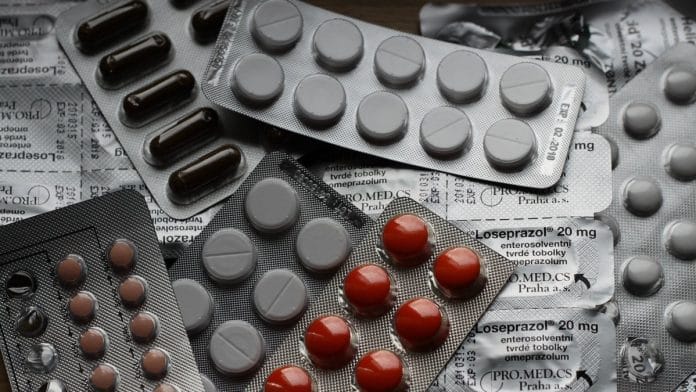New Delhi: A group of ministers comprising Amit Shah (home) and Rajnath Singh (defence) will look into legalising online drug sales after the Modi government failed to push through the measure by its targeted deadline, ThePrint has learnt.
The second Modi government wanted to introduce the framework within its first 100 days in office, but couldn’t, owing to immense pressure from brick-and-mortar chemists, who are said to form a crucial votebank, including in poll-bound Maharashtra.
“The pressure from the offline chemists lobby — the All India Organisation of Chemists and Druggists (AIOCD) — is severe,” said a senior official from the Ministry of Health and Family Welfare.
Two sources in the ministry, including the aforementioned official, confirmed that the government had now shifted the mandate to the group of ministers (GoM).
According to the sources, the GoM also comprises Health Minister Dr Harsh Vardhan and Chemicals and Fertilisers Minister D.V. Sadananda Gowda.
“The final call will now come from the GoM,” said the official quoted above. “No date has been fixed yet for a meeting, but it is expected to take place before the end of the year.”
The government, the second source added, has been ready with the final notification since August.
“The issue is critical so it has been referred to the GoM,” said the source, who is also an officer in the Health Ministry.
“It is about the availability of medicines in the market and consensus of stakeholders is important,” the official said. “The ministers will now decide how to go ahead.”
Also Read: Rules for online sale of medicines top new Modi govt’s 100-day agenda
‘A big votebank’
According to the Health Ministry source, the AIOCD is “a powerful lobby of over 8.5 lakh chemist outlets across India”.
“It is also a big votebank, especially in Maharashtra, where elections are due in sometime. It is one of the primary reasons why the decision on e-pharmacies failed to meet the 100-day target,” said the source.
Brick-and-mortar pharmacies have been expressing discontent against the move to legalise e-pharmacies since 2015, when the government first started debating the possibility of forming an online ecosystem for the sale of medicines.
While e-pharmacies do exist in India, they are considered on a par with their brick-and-mortar counterparts in the absence of dedicated rules to regulate this online market.
Over the past four years, the AIOCD has held several protests across India by shutting down chemist shops and holding 24-hour strikes.
Just recently, the lobby declared war on the country’s third-largest pharmaceuticals company, Cipla, after reports this August hinted that the firm was tying up with the online pharmacy chain Medlife.
At the time, the AIOCD said “it is planning to sideline and stop promoting products manufactured by the company”.
The Mumbai-based drugmaker subsequently sought to pacify the lobby, saying that “it has no plans to venture into e-pharmacy”.
Had almost been pushed through
The draft regulations for e-pharmacies were approved by two committees after the return of the Modi government.
It was first considered by the Drugs Consultative Committee (DCC) — an advisory body that offers suggestions to the central and state governments and the Drugs Technical Advisory Board (DTAB) — on 1 June.
The DTAB then deliberated on the DCC’s recommendations on 11 June and agreed to it with some amendments.
The draft then went to the Central Drugs Standard Control Organisation, the apex drug regulatory body under the health ministry that is overseeing the e-pharmacy initiative, for the preparation of the final notification, which was cleared before the matter was handed to the GoM.
Also read: Nearly 20% of all pharma products sold in India are counterfeit, US trade body claims






